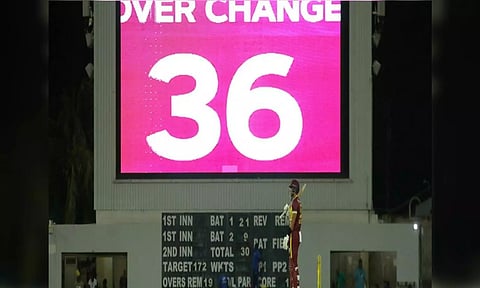

DUBAI: The International Cricket Council (ICC) on Friday announced that they have mandated the use of stop-clocks in between overs in limited-overs international matches, starting with the ICC Men's T20 World Cup 2024 in the West Indies and USA.
"ICC Board also approved the playing conditions for the Men's T20 World Cup 2024 and announced the qualification process for the 2026 edition," the council said in a statement on Friday.
The decisions were taken on Friday, following the ICC's annual Board meetings. The stop-clock is set to become permanent in all ODIs and T20Is from June 2024, starting with the ICC Men's T20 World Cup 2024 in the West Indies and USA.
Last year in December, ICC introduced a 'stop clock', on a trial basis, in full-member men's ODI and T20I matches between December 2023 and April 2024 to speed up the pace of play in international cricket.
The results presented to the Chief Executives' Committee (CEC) showed that approximately 20 minutes had been saved per ODI match.
The feature will now be mandatory in all Full Member ODI and T20I matches beginning June 1, 2024. According to the stop clock rule, which was trialled in men's white-ball cricket, the fielding side must begin a new over within 60 seconds of the previous over's completion.
"An electronic clock, counting down from 60 to zero, will be displayed on the ground, with the onus on the third umpire to determine the start of the clock," a statement from the ICC read.
The stop clock will restrict the amount of time taken between overs, meaning that the bowling team will need to be ready to bowl the first ball of their next over within 60 seconds of the previous over being completed. Failure to do so for the third time in an innings (following two warnings) will result in a five-run penalty being imposed against the fielding team.
There are a few exceptions to this rule, and the clock, if already started, can be cancelled in certain situations. These include:
"When a new batter comes to the wicket between overs. An official drinks interval has been called. The umpires have approved the onfield treatment of an injury to a batter or fielder. The time lost is for any circumstances beyond the control of the fielding side," ICC said.
"The ICC Board and Committee meetings are the forum for us to discuss the long-term future of the international game and at this set of meetings, we spent a number of hours constructively considering the structure of the global cricket calendar. Whilst there are no easy answers, there is a commitment to exploring how context can be delivered and further options will be considered at upcoming meetings," ICC Chair Greg Barclay said, according to the statement.
The tournament will kick off on June 1 and will be co-hosted by the West Indies and the US.